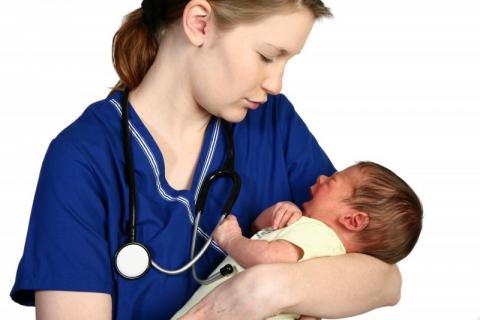Rotavirus vaccine – a tremendous success story

Since July last year the routine childhood immunisation schedule has included the rotavirus vaccine to help protect babies against the very common and potentially serious diarrhoea and vomiting bug. The Public Health Agency (PHA) is pleased to report that the latest figures show that the number of confirmed rotavirus cases is significantly down compared with the previous four years, showing that the vaccine is making a real difference.
Dr Richard Smithson, Consultant in Health Protection with the PHA, said: “On reviewing the provisional figures for the first four months of this year for laboratory-confirmed cases of rotavirus, there was a 75% reduction compared with the average for the same period for the previous four years – 76 cases compared with an average of 281.
“The vaccine was only introduced on 1 July 2013 and this reduction has come sooner and is better than we had anticipated. Although we don’t have official uptake figures yet, we do know that it is in excess of 90%.”
Rotavirus is an infection of the lower gut which causes vomiting and diarrhoea in thousands of young babies every year. Most babies recover at home, but in some cases they can become dehydrated and may need hospital treatment. In Northern Ireland this infection is responsible for around 4,000 GP visits and 400 hospitalisations every year in children under five years.
Rotavirus spreads easily through hand-to-mouth contact and can be picked up from surfaces such as toys, hands or dirty nappies. It can also be spread through the air. Washing hands and keeping surfaces clean can help reduce the spread of the virus but will never completely stop it. Vaccination is a much more effective way to protect infants from getting infected.
Babies attending for vaccination are offered the vaccine as part of their two- and three-month vaccination appointments with their local GP. The vaccine is administered as a droplet directly into the baby’s mouth.
Dr Smithson continued: “The vaccine will be given to babies at their two- and three-month appointments. The first dose cannot be given to babies 15 weeks or over. The second dose should be given four weeks after the first dosage and must be before 24 weeks of age. It is therefore important that babies attend their appointments at the correct time.
“We would like to thank GPs, health visitors, practice nurses, treatment room nurses, child health system staff and administrative support staff for all their hard work in making this such a success.
“We would also like to pay particular tribute to parents for choosing to get their babies vaccinated and helping to protect them against this unpleasant condition, which can end up putting children in hospital.
“This is yet another vaccination success story in Northern Ireland, where we have an excellent record of achieving good uptake for all our childhood vaccines and helping protect our children against a wide range of potentially serious infectious diseases.”
Welcoming the figures, Health Minister Edwin Poots said: “Rotavirus spreads very easily and affects thousands of children every year, causing distress for them and their families. I am delighted to note such an impressive reduction in cases since the introduction of the vaccination programme. I want to congratulate the parents and all the health care staff involved for making this programme so successful so quickly.”
For further information on the rotavirus vaccine see the parents’ guide Immunisation for babies up to a year old available at www.bit.ly/babyimmunisations or you can ask your GP or health visitor.
Ends
